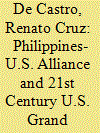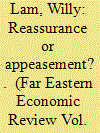|
|
|
Sort Order |
|
|
|
Items / Page
|
|
|
|
|
|
|
| Srl | Item |
| 1 |
ID:
186532


|
|
|
|
|
| Summary/Abstract |
This article situates the Philippines-U.S. alliance within the changing U.S. grand strategies from Barrack Obama’s rebalancing to Asia to President Joe Biden’s continuance of the Trump Administration’s strategic competition with China. Upon President Obama’s announcement of the rebalancing policy in 2011, the Philippines already figured prominently in the American security agenda in Asia, particularly with the intensification of the Philippines-China territorial dispute in the South China Sea. In 2016, President Rodrigo Duterte effected a major shift in Philippine foreign policy by distancing the country from the U.S. and gravitating toward China. The Trump Administration, however, saw the Philippines as a crucial ally in its geostrategic competition with China. Consequently, Washington adopted a policy of strategic patience to bring Duterte onside the U.S. rather than pushing him to China’s embrace. This scheme stabilized the two countries’ security relations and ensured the Philippines’ commitment to the U.S. system of bilateral alliances. In conclusion, the article argues that given the Philippines’ close security ties with the U.S. that often clash with China’s strategic interests and close Philippines-China diplomatic/economic relations, it will be difficult and challenging for President Duterte to pursue an independent foreign policy.
|
|
|
|
|
|
|
|
|
|
|
|
|
|
|
|
| 2 |
ID:
095129


|
|
|
| 3 |
ID:
160350


|
|
|
|
|
| Summary/Abstract |
This paper seeks to find an answer to the question of why China’s effort to curb
North Korea’s nuclear development has failed to produce expected outcomes.
Since the second North Korean nuclear crisis in 2002, China, as the most, if not
sole, influential country to North Korea, has been attempting to restrain the North’s
nuclear armament. Nevertheless, Beijing has always failed to sustain its pressure
on Pyongyang long enough to restrain Pyongyang’s nuclear ambition; instead, it
has often ended up with China’s appeasement policy. Witnessing such failure, some
scholars assert that Beijing is able, but not willing, to curb Pyongyang’s nuclear
armament, while others claim that Beijing’s leverage over Pyongyang is a lot
more limited than widely thought. Yet, both schools of thought, focusing narrowly
on China’s capability or willingness to restrain North Korea, has failed to depict
a full picture. By contrast, this study, employing a game theory approach, views
Sino–DPRK relations as a strategic interaction between restrainer and restrainee.
It argues that North Korea’s tactical deception and military adventurism shuffle
China’s political priorities on the Korean peninsula, thereby preventing China from
pressuring North Korea.
|
|
|
|
|
|
|
|
|
|
|
|
|
|
|
|
|
|
|
|
|